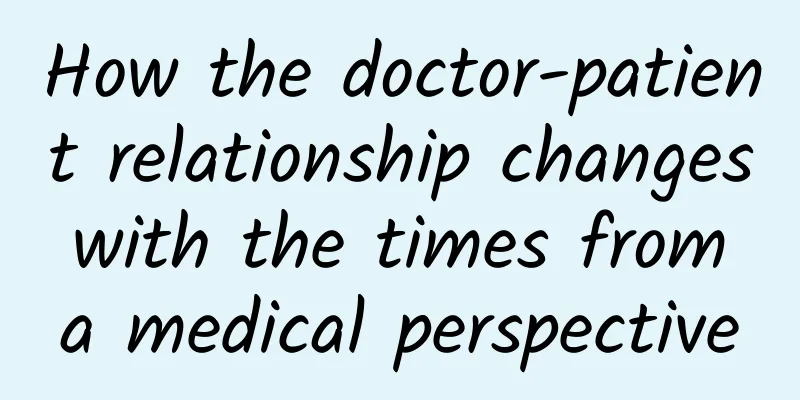How the doctor-patient relationship changes with the times from a medical perspective

|
This is the 3824th article of Da Yi Xiao Hu Since the beginning of the year, I have been carefully studying the book "Group Medicine" translated by Academician Wang Chen, and I was deeply shocked. Just a few days ago, I had the honor to read the article "Doctor-patient relationship should change with the times, how should it change?" written by Professor Yuan Jie, which was published on the public account "Da Yi Xiao Hu". I also benefited a lot from it, so I came up with the idea of writing a reading experience from the perspective of group medicine to respond to Professor Yuan Jie. At the beginning of the article, Professor Yuan Jie pointed out that due to the ever-changing social and historical background, the doctor-patient relationship has also been evolving and developing. In ancient times, the doctor-patient relationship was simple, and everything from obtaining the condition, making a diagnosis to implementing the treatment was done directly by a doctor. The doctor was fully responsible for the patient, and the patient completely entrusted his health and life to the doctor. With the development of modern medicine and industrial society, the simple doctor-patient relationship has changed. At present, in the medical service system of most countries in the world, the required medical resources are paid by the whole people, and patients are striving to ensure that patients will no longer be unable to obtain medical treatment because they cannot afford the medical expenses. The people who pay for these medical services include not only patients who have already used medical and health care and patients who are sick but have not used the resources, but also people who are healthy now and may never suffer from this disease. The responsibilities of doctors have also changed accordingly, not only including wholeheartedly treating every patient they see, but also assuming the responsibility of medical resource managers, so that all people with medical needs (but who cannot come to the clinic for face-to-face consultation) can make good use of medical resources, and at the same time be responsible for the entire population. Therefore, the relationship between doctors and patients requires changes accordingly. In past medical practices, healthcare managers and clinicians have been committed to improving the quality of medical care. Although focusing on improving the quality of medical care can increase value, it cannot maximize value. Although there is strong evidence that a certain intervention has more benefits than disadvantages, it may not be of high value to a certain group or individual. This is because the value of an intervention depends on the environment in which it is implemented, and the environment determines whether the intervention is appropriate. The evaluation of the effectiveness of an intervention is objective, while the evaluation of the appropriateness of an intervention is subjective. In healthcare, value is measured by the relationship between outcomes and costs, using the following formula: Value = Outcome / Cost Since any medical measure has its pros and cons, the formula is modified: Value = (good ending - bad ending) / cost Although high-quality medical and health care, evidence-based decision-making, and patient safety are still important, the 21st century has entered an era where health outcomes dominate values. Patients' views on outcomes are increasingly valued, and we should not only measure how much care patients receive from medical staff, but also examine their views and opinions on medical and health care outcomes. In the past 20th century, people saw more benefits brought by the development of medical technology, but in the 21st century, the main focus for both patients and the public is the balance between benefits and disadvantages. Therefore, in the process of medical decision-making, patients' preference-sensitive decisions must be respected, that is, the trade-off between benefits and disadvantages should be made by patients in an informed manner. For example, when male patients choose prostate cancer treatment options, they need to consider whether avoiding incontinence or sexual dysfunction is more important to them. They need to get full support from medical staff and patients to participate together - "doctors and patients work together" to reduce and avoid "silent misdiagnosis". The so-called "silent misdiagnosis" means that even when the disease is accurately diagnosed, clinicians still fail to understand the patient's personal preference for treatment selection and choose interventions that are contrary to the patient's values. In the 20th century, medical professionals always provided medical and health care services based on the concept of "the more the better". However, in the 21st century, a new paradigm has emerged - the "three do's" of health services - what can be done, what is actually done, and what should be done. With the aging population and the surge in “can dos” caused by the development of medical technology, the increase in medical service capacity and costs in the future will be an imminent “tragedy of the commons”. The biggest challenge we face is not to expand “can dos”, but to take “should dos” as the principle. Otherwise, our medical and health system will collapse either financially or morally. Author: Wang Hailong, attending physician, Hematology Hospital, Chinese Academy of Medical Sciences |
<<: Approaching Breast Hyperplasia
>>: Do you get how to manage your home medicine cabinet?
Recommend
Is the dark butt crack caused by uterine cold?
Does the dark butt crack mean cold uterus? Uterin...
What should I do if I have allergic reaction to sanitary napkins?
Allergy is a common phenomenon in life, usually w...
Female shoulder pain
Salaried workers who often sit in front of comput...
Does your child always catch colds? Be careful, it may be this virus that is causing trouble!
Just after work in the afternoon, a mother rushed...
Can I get pregnant on the first day after my period?
In order to prevent pregnancy reasonably, you nee...
How many days of pregnancy will it take to know whether it is an ectopic pregnancy?
Nowadays, more and more people worry about ectopi...
Can a girl still grow taller at 18?
Many parents are worried about whether their chil...
What is the reason why women often have odor down there?
Vaginitis is mainly caused by poor hygiene and mu...
Gynecological sacral location
There are eight points in the Bladder Meridian, f...
Can I drink cassia seed tea during menstruation?
Cassia seed tea has the effect of clearing liver ...
How long does it take to do a NT scan?
After a woman becomes pregnant, she needs to have...
What should you pay attention to in the second week of pregnancy
When the expectant mother is 2 weeks pregnant, ge...
How big should the gestational sac be to be suitable for medical abortion?
If a woman has an unexpected pregnancy, she canno...
Do you really know how to use nitroglycerin tablets? Improper use will make the "life-saving medicine" ineffective
Nitroglycerin is a "life-saving drug" t...
What causes heavy bleeding in early pregnancy?
Pregnancy is a very special period, especially as...









